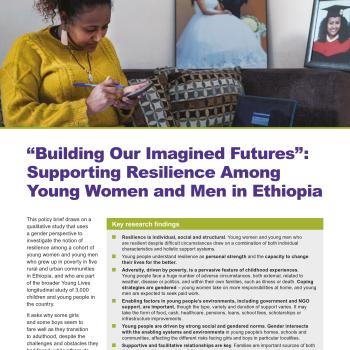
This policy brief draws on a qualitative study that uses a gender perspective to investigate the notion of resilience among a cohort of young women and young men who grew up in poverty in five rural and urban communities in Ethiopia, and who are part of the broader Young Lives longitudinal study of 3000 children and young people in the country. It asks why some children seem to fare well as they transistion to adulthood, despite the challenges and obstacles they had faced, whilst others do less well.
This is one of a set of eight briefs summarising key findings and policy implications from eight working papers based on the research for the Young Lives fifth wave qualitative survey in 2019. The research, and the working paper and this brief were funded by UNICEF Ethiopia.

This policy brief draws on a qualitative study that uses a gender perspective to investigate the notion of resilience among a cohort of young women and young men who grew up in poverty in five rural and urban communities in Ethiopia, and who are part of the broader Young Lives longitudinal study of 3000 children and young people in the country. It asks why some children seem to fare well as they transistion to adulthood, despite the challenges and obstacles they had faced, whilst others do less well.
This is one of a set of eight briefs summarising key findings and policy implications from eight working papers based on the research for the Young Lives fifth wave qualitative survey in 2019. The research, and the working paper and this brief were funded by UNICEF Ethiopia.

